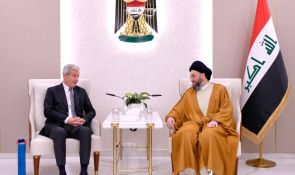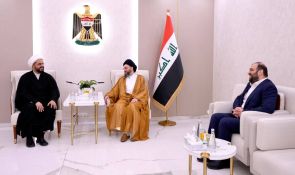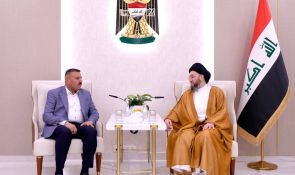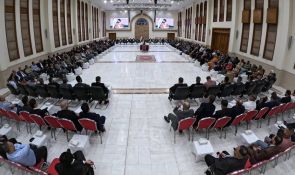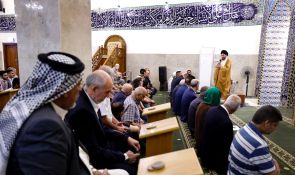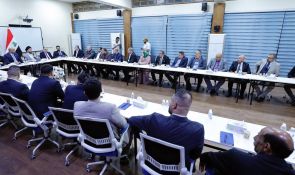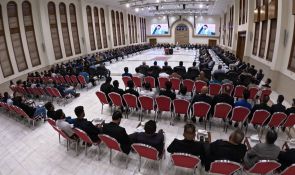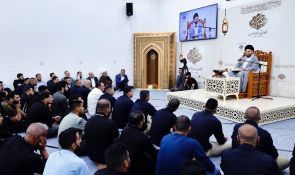Sayyid Ammar al-Hakim says, “The Movement of the Martyr of the Niche pledged to be a bridge for the people towards freedom, security and independence.”
Sayyid Ammar al-Hakim, Head of the Islamic Supreme Council of Iraq (ISCI), has stressed the necessity for the political forces to accept each other and to hold dialogues for the sake of a lofty issue which is: the issue of the homeland, of the people, of the nation’s destiny. He called for believing in dialogue as the master of solutions and in the constitution as the master of situation, that agreements form a trust with men, renewing his call for the establishment of the fair modern state, regarding the call as an invitation to realize the dreams of a patient, firm and brave nation that dreams of a state that embraces him in its folds and launches him to the vistas of the future, stressing that patriotism in the society and nation is like the heart in the body. He called for making Kerbala a label for unity so it may save the nation’s plan, for Kerbala of the past defeated falsehood, so Kerbala of the present should defeat division and dispute and create the unity of the goal, of the plan and of the vision. He renewed his support for the initiative of His Excellency President Talabani in transcending the crises and chokes via dialogue. He also called on the council of ministers to carry out the suspended projects, including that of the “Basra: Economy Capital” in its capacity as an outgiving city that deserves we reciprocate goodness for it. This came up in the speech which His Eminence delivered at the Industry Stadium in Baghdad in the presence of large crowds of organizations of the Movement of the Martyr of the Niche on the anniversary of the 9th of Muharram which was held simultaneously in 14 governorates on Saturday, November 24, 2012.
Members of the Movement of the Martyr of the Niche broke the “I” pronoun, safeguarded the trust and followed the advice
His Eminence pointed out that the Movement of the Martyr of the Niche is proud of breaking the “I” pronoun, undertaking a pledge before Allah and the nation to be the bridge on which the people pass to freedom, security, independence and prosperity, and that the nation’s interests will always come ahead of is own, that the people’s goals are its goals, explaining that this is what the Martyr of the Niche had entrusted to them, Grand Ayatollah Sayyid Muhammed Baqir al-Hakim, may his soul be sanctified, and this is what Iraq’s Aziz had enjoined them, namely the late Sayyid Abdul-Aziz al-Hakim, may his soul be sanctified. He explained that the sons of the Movement of the Martyr of the Niche are the best to safeguard a trust and uphold advice, calling on them to score victory over the “I” and over egotism with the “We” pronoun instead, with tolerance, self-denial and the true personification of the word “we” in their conduct and work for the sake of the homeland and of the citizen.
Dialogue is the master of solutions, the constitution is the master of situations
His Eminence explained that if Iraq is desired to be a role model for the Arabs and Muslims, challenges have to be encountered with courage, ability and open-mindedness on the level of the homeland and of the citizen, calling for belief in dialogue as the master of solutions, in the constitution as the master of situations and in the agreements as a trust with men, renewing his support for the initiative of His Excellency President Talabani in transcending the crises and chokes through dialogue. He explained that the language of dialogue will prevail if the political groups distance themselves from the language of tense statements, and this will cause our people to avoid the repercussions of the dim standing political feud from which nobody will come out victorious. He emphasized the necessity of bearing the responsibility by passing the laws and legislations that contribute to minimizing the concerns, calling on the council of ministers to carry out the suspended projects, including that of “Basra: Economy Capital” in its capacity as an outgiving city worthy of our reciprocating the goodness with which it supports us, stressing the necessity of focusing the concept of the official as one who respects his people, that the official is not so due to his position, justifying it by positions belonging to the people, and the official is entrusted with it: Any shortcoming is a betrayal of this nation.
Corruption: The plague of plagues, the Number One destroyer of state, the one that violates the people’s rights
The Head of the Islamic Supreme Council of Iraq has regarded corruption as the most serious plague, the Number One destroyer of state and the Number one violator of people’s rights, stressing the necessity of uprooting it, conditioning the slogan of fighting corruption as another corruption through which wars of political and social ousting wars are waged. He addressed the sons of the Movement of the Martyr of the Niche that the memory of the 9th of Muharram “coincides with the 30th anniversary of the birth of the Supreme Council,” expressing his pride in the path of the Movement of the Martyr of the Niche be along the steps of al-Hussain in word, in action, in creed and in methodology, emphasizing that in all difficult moments, our compass will be Kerbala: From it do we learn and our thirst is quenched, calling on the sons of the Movement of the Martyr of the Niche to be followers of al-Hussain with their outgiving and perseverance in order to understand the vision of al-Hussain and to follow his principles.
His Eminence stressed that the Movement of the Martyr of the Niche with the truth is the truest evidence for their loyalty to al-Hussain’s program, and that outgiving is more than taking; it i al-Hussain’s way, it is support for the nation’s project through outgiving and without the nation bargaining on this outgiving; rather, it is a purely Hussaini culture. He called for utilizing Ashura saying, “No Ashura should bypass us while we drown ourselves in tears without standing at the meaning of this great event,” stressing that al-Hussain’s companions created of Kerbala an epic full of greatness and loftiness.
Al-Hussain: The peak of peaks, the brilliant leader who separated himself from time and place
During the anniversary commemoration of the 9th of Muharram, Sayyid Ammar al-Hakim stressed that standing at the gates of al-Hussain is to derive resolve, strength, will power, to get to know the features of his plan for change, for fighting deviation and corruption, regarding al-Hussain (Ú) as the peak of peaks in immortality, elevation and loftiness, for man in the full sense of humanity. He pointed out to al-Hussain being great in his pains, big in his humanity, a hero in his courage, an immortal in his defiance, stressing the he (Ú) represents the torch that lights humanity’s march, the spirit that grants life its meaning. His Eminence stressed that if immortality had a meaning, al-Hussain (Ú) is that meaning: The message of the heavens was given of the bloods of al-Hussain (Ú) to drink in order to stay alive and effective. From the spirituality of al-Hussain (Ú) principles and the creed became firm. Through the banner of al-Hussain (Ú), we are guided to the steps of the genuine Islam of Prophet Muhammed (Õ). Through the methodology of al-Hussain (Ú) did light shine in the paths of humanity.
Loftiness means al-Hussain (Ú), sacrifice means al-Hussain (Ú) and all ethical virtues
His Eminence explained that the 9th day of Muharram is the day when history stands in awe before the peak of loftiness, when the world derives inspiration about the summit of sacrifice and humanity solemnly bows down before the peak of heroism. His Eminence added that loftiness means al-Hussain (Ú), sacrifice means al-Hussain (Ú), heroism means al-Hussain (Ú). All ethical virtues were personified in al-Hussain. His Eminence wondered: Who can harm our peak as we walk along the program of the peak of peaks?! Who can cope with our courage while we are the sons of the school of heroism and perseverance?!
He indicated that the mind becomes confused and the letters stumble when al-Hussain (Ú) is mentioned. His Eminence wondered: Which mind can withstand this giant ideology which al-Hussain (Ú) expressed in the Ashura epic? Which letters can describe and express this Hussaini elegance and brilliance? He called for openness on the scopes of the Hussaini school, to break the chains of close-mindedness through ideology and conduct, to release the souls in the loftiness of al-Hussain, emphasizing that one who wants to clearly and deeply understand the role played by al-Hussain (Ú) has to clearly and deeply understand the Divine plan on earth the requirements for the continuation and endurance of which were represented by the Hussaini sacrifice. He called for breaking the locks of mental closeness in order to set out in al-Hussain’s scopes, to cleanse life of fakeness and forgery. It is then that al-Hussain’s vision becomes clear to us, outgiving will be over-pouring, the doors of al-Hussain (Ú) will be wide open. He advised those who argue in understanding the revolutionary aspect of al-Hussain that they should not measure al-Hussain by revolutionaries because al-Hussain was a revolution that summed up all revolutions throughout the ages, one that carried inside it the sighs of all revolutionaries. He stressed that al-Hussain fought through the strength of righteousness and logic, whereas his enemies fought him with the weapon’s force. His Eminence pointed out saying, “This is why their force collapsed although they won a round. Logic and righteousness won although they lost an opportunity; hence, al-Hussain’s victory was perpetual.
Al-Hussain is not tears but a program, a label
His Eminence stressed that al-Hussain (Ú) is not tears but a program. Al-Hussain (Ú) is not only a mere leader; rather, he is a program, a label. He added saying, “Al-Hussain (Ú) taught us not to break no matter how the wounds wear us out. He taught us not to lower our flags even if they are torn.”
As regarding those who oppose mourning him with tears, His Eminence stressed that our tears are the oil that increases our purity, flame, enthusiasm, motivation and belief in the principles, plan and issue of al-Hussain (Ú), pointing out that the followers of al-Hussain (Ú) weep over their dignity which is lost at the hands of the tyrants so they may reclaim it through the dignity and prestige of al-Hussain lost, stressing that weeping has granted us the ability to withstand, removing from our path abjectness and humiliation.
His Eminence explained that the enemies struck the head of al-Abbas lost, perhaps he would bend for them, so he fell on the ground without bending. They crushed his sacred head with iron, yet he did not bow down except to Allah, so much so that knight al-Abbas lost turned into a thorn in their eyes. Al-Abbas has the honor, all of it. He explained that Zainab, the lady of wisdom, turned into the voice of al-Hussain (Ú), personifying his image. He was his extension, his perpetuation, the person and the character of al-Hussain. He pointed out that this wise lady was a revolting volcano that articulated the truth. Just as al-Hussain (Ú) had put on his father’s mantle in facing tyranny, Zainab put on the mantle of her mother in facing deviation, standing beside her brother, Imam and leader.
Islamic history will remain incomplete, deficient, as long as it is incapable of absorbing the greatness and plan of al-Hussain (Ú)
His Eminence called on the sons of the Movement of the Martyr of the Niche who were simultaneously commemorating the 9th of Muharram in 14 governorates to learn outgiving from al-Hussain, his Ahl al-Bayt and companions as the only way to win victory. It is thus that the fruits of freedom and glory are plucked. He stressed that the Islamic history would remain incomplete and incapable so long as it is unable to absorb the greatness of al-Hussain (Ú) and his plan, and the Muslims will keep suffering marginalization and encroachment as long as they pass by the memory of al-Hussain (Ú) casually rather than deriving moral lessons from it. He explained that the future of the Islamic world and that of the states and nations is linked to the extent of their understanding of the greatness of Imam al-Hussain (Ú) and the brightness of its methodology, stressing that al-Hussain (Ú) confronted this falsification from the very beginning, regarding the deviation as humiliating the Islamic peoples and standing in the way of nations’ progress. He emphasized that if the Islamic world wants to set out to the open fields of internationalism, it must remove the contradictions from its history and gets to know the value of its real heroes. When the Muslims in the world stand respectfully for the sacrifices of al-Hussain, it is then that the whole world will stand to respect Islam and Muslims. He pointed out to the impossibility of separating the Ashura events from our present and future, justifying this by al-Hussain (Ú) transcending time and place and fusing into the past, regarding Ashura as the epic of the conflict between two paths: Yazid’s path and al-Hussain’s path. Yazid’s followers asked the latter how much he would pay them to fight, whereas al-Hussain’s followers wee asking him how many times he wanted them to fight before him so they would go back to fight again and again. He explained that it is a struggle between a program that takes and one that gives, stressing that al-Hussain and his followers represented a program for giving and for life, not one of death; rather, sacrifice is the imminent label for their outgiving, so they presented their lives as a sacrifice.
His Eminence explained that number does not determine who wins; rather it is the quality of the giving that achieves victory. He explained that al-Hussain’s companions were few but their outgiving was great. Their enemies were large in number who plundered much, so outgiving won, becoming immortalized, while taking broke down, becoming naught.
Zionists are haughty and barbaric not due to their strength but because of the Muslims being divided and their stance disunited
His Eminence stressed the necessity of supporting the Palestinian people in besieged Gaza, condemning the embarrassing international silence and the shameful collusion with the Zionist killing machine as it flexes its barbarism on an unarmed people. He told the Arab and Muslim brethren that the haughtiness and barbarism of the Zionists is not due to their strength but because of our disunity and due to our stances being disunited, regarding Palestine as a bleeding wound, that the men of honor will keep bleeding until Allah affects His promise and grants victory to those who defend their freedom, dignity and honor. He stressed that the Kerbala of honor and dignity, and the usurped Jerusalem, are one path, one issue, one right, one method which is that of freemen who raise the eternal slogan of al-Hussain: “Far it is from us to accept humiliation.”
With regard to the Syrian situation, Sayyid Ammar al-Hakim said that the Syrian people deserve freedom and dignity, security and safety, that the homeland is the basis, that the suffering has lasted for too long, and that everyone must listen to the language of reason, and that nobody supports Syria except the Syrians themselves, and nobody will dress Syria’s wounds other than its own sons.
About the situation in Bahrain, Sayyid Ammar al-Hakim stressed his pain at this situation which is rejected by humanity and by patriotism, pointing out to the peoples being the ones that stay, whereas everything else vanishes, explaining that the logic of force will not be decisive no matter how intense this force may be and how diverse its methods are, resting his hope on the wisdom of the leadership in the sisterly kingdom of Bahrain.
It must be mentioned that commemorating Imam al-Hussain on the 9th of Muharram took place in more than one governorate and at the same time despite the circumstances of the rain and cold in beloved Baghdad, in the Basra of goodness, in Misan of jihad, in Thi-Qar of culture, in Diwaniyya of outgiving, in Muthanna of revolution, in Wasit of pride, in Babylon of civilization, in Diyala of honor, in Salahud-Deen of originality, in Kirkuk of brotherhood, in Mosul of the Leaning Minaret, of Arbil of the fortress and of ever-populated Sulaymaniyya.


